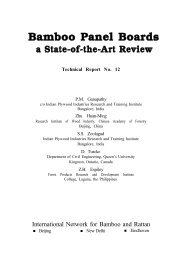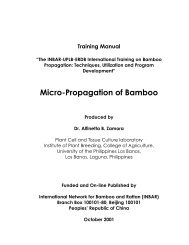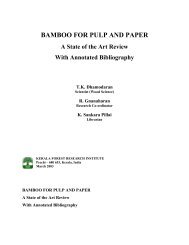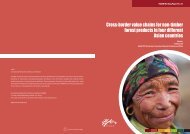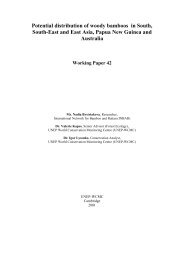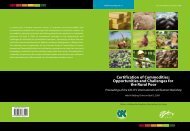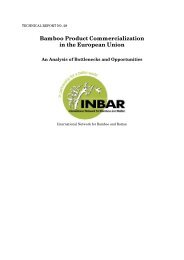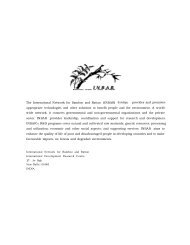The Bamboo and Rattan Sectors in Asia: an Analysis of ... - INBAR
The Bamboo and Rattan Sectors in Asia: an Analysis of ... - INBAR
The Bamboo and Rattan Sectors in Asia: an Analysis of ... - INBAR
Create successful ePaper yourself
Turn your PDF publications into a flip-book with our unique Google optimized e-Paper software.
to do replacement pl<strong>an</strong>t<strong>in</strong>g, <strong><strong>an</strong>d</strong> the export b<strong>an</strong>s <strong><strong>an</strong>d</strong> other restrictions. <strong>Ratt<strong>an</strong></strong> seems<br />
to be particularly <strong>in</strong>terest<strong>in</strong>g to governments look<strong>in</strong>g for ways to <strong>in</strong>crease employment<br />
<strong><strong>an</strong>d</strong> <strong>in</strong>come generation. <strong>The</strong> ratt<strong>an</strong> furniture <strong><strong>an</strong>d</strong> h<strong><strong>an</strong>d</strong>icrafts m<strong>an</strong>ufactur<strong>in</strong>g <strong>in</strong>dustries<br />
are relatively labor-<strong>in</strong>tensive <strong><strong>an</strong>d</strong> have high value addition. From this perspective, it<br />
is attractive to try to reta<strong>in</strong> the value added with<strong>in</strong> the country or prov<strong>in</strong>ce that<br />
produces the raw material. However, ratt<strong>an</strong> furniture <strong><strong>an</strong>d</strong> h<strong><strong>an</strong>d</strong>icrafts products are<br />
bulky, imply<strong>in</strong>g high tr<strong>an</strong>sport costs for f<strong>in</strong>ished products, <strong><strong>an</strong>d</strong> there are other strong<br />
economic rationales for hav<strong>in</strong>g centrally located m<strong>an</strong>ufactur<strong>in</strong>g for export. Still, several<br />
state governments are experiment<strong>in</strong>g with <strong>in</strong>tra-country export b<strong>an</strong>s on unprocessed<br />
ratt<strong>an</strong>. Sulawesi <strong>in</strong> Indonesia has had such a b<strong>an</strong> for several years.<br />
India, Indonesia, Laos <strong><strong>an</strong>d</strong> the Philipp<strong>in</strong>es all have some ratt<strong>an</strong>-specific policy<br />
<strong>in</strong>struments. <strong>The</strong>se are licens<strong>in</strong>g systems that give exclusive harvest<strong>in</strong>g rights with<strong>in</strong><br />
a prescribed area, <strong>in</strong> return for concession fees <strong><strong>an</strong>d</strong> the obligation to pay royalty fees<br />
for ratt<strong>an</strong> harvested. In the Philipp<strong>in</strong>es, the system is quite well developed (though<br />
poorly enforced) to encourage repl<strong>an</strong>t<strong>in</strong>g <strong>in</strong> the ratt<strong>an</strong> concessions. Enforcement <strong><strong>an</strong>d</strong><br />
fee collection is done <strong>in</strong> all cases us<strong>in</strong>g tr<strong>an</strong>sport permits, a system that is notoriously<br />
abused. People tr<strong>an</strong>sport<strong>in</strong>g ratt<strong>an</strong> are open for extortion by police <strong><strong>an</strong>d</strong> forest guards.<br />
In their turn, ratt<strong>an</strong> permit holders circumvent cutt<strong>in</strong>g limits by recycl<strong>in</strong>g permits<br />
<strong><strong>an</strong>d</strong> us<strong>in</strong>g other "special operat<strong>in</strong>g procedures" (bribes). Corruption <strong>of</strong> this k<strong>in</strong>d was<br />
reported <strong>in</strong> all cases.<br />
Any regulation will be <strong>in</strong>effective unless it is properly enforced. In the forest<br />
products sector, where so much <strong>of</strong> the production is geographically dispersed <strong><strong>an</strong>d</strong> <strong>in</strong><br />
remote areas, proper enforcement is very difficult, if not impossible. Instead, <strong>in</strong> all<br />
the cases studied, enforcement was focussed on the tr<strong>an</strong>sportation <strong>of</strong> raw material.<br />
While practical <strong>in</strong> theory, the system is susceptible to abuse. As revealed across the<br />
studies, it is <strong>in</strong> everyone's <strong>in</strong>terest to cheat. For <strong>in</strong>st<strong>an</strong>ce, tr<strong>an</strong>sporters seek through<br />
bribes to reduce the time, <strong>in</strong>convenience <strong><strong>an</strong>d</strong> costs <strong>of</strong> obta<strong>in</strong><strong>in</strong>g proper permits, <strong><strong>an</strong>d</strong><br />
police <strong><strong>an</strong>d</strong> forest checkpo<strong>in</strong>t <strong>of</strong>ficers are happy to have some leverage to extract<br />
payments to supplement their salaries. It is safe to say that the current permit system<br />
<strong>in</strong> Indonesia, the Philipp<strong>in</strong>es <strong><strong>an</strong>d</strong> India, <strong><strong>an</strong>d</strong> to a lesser degree <strong>in</strong> Laos, is <strong>in</strong>effectual<br />
as a tool for resource m<strong>an</strong>agement <strong><strong>an</strong>d</strong> as a tool for collect<strong>in</strong>g payment for resource<br />
rents.<br />
Furthermore, the system does not dist<strong>in</strong>guish between wild ratt<strong>an</strong> that is extracted<br />
from the forest <strong><strong>an</strong>d</strong> cultivated/m<strong>an</strong>aged ratt<strong>an</strong>. Royalty charges are levied on ratt<strong>an</strong><br />
on the pr<strong>in</strong>ciple that forest products are a part <strong>of</strong> the rent accru<strong>in</strong>g to state l<strong><strong>an</strong>d</strong>. Any<br />
<strong>in</strong>vestment by <strong>an</strong> <strong>in</strong>dividual to enh<strong>an</strong>ce this production is therefore a subsidy to the<br />
state. In a case such as that <strong>of</strong> the ratt<strong>an</strong> gardens <strong>in</strong> Kalim<strong>an</strong>t<strong>an</strong>, the ratt<strong>an</strong> grown is<br />
essentially <strong>an</strong> agricultural crop <strong><strong>an</strong>d</strong> a 'Forest Product Royalty' for it does not seem<br />
justifiable. Such fees create <strong>an</strong> additional burden on the producers, <strong><strong>an</strong>d</strong> <strong>in</strong>crease the<br />
tr<strong>an</strong>saction costs <strong>of</strong> gett<strong>in</strong>g the ratt<strong>an</strong> to the ratt<strong>an</strong> products m<strong>an</strong>ufacturers. <strong>The</strong><br />
relatively high levels <strong>of</strong> graft <strong>in</strong> the system me<strong>an</strong> that very little <strong>of</strong> the royalty,<br />
wrongly charged though it may be, actually gets to the state's c<strong>of</strong>fers.<br />
74



